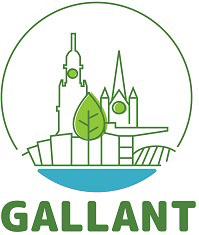
The University of Glasgow, in partnership with Glasgow City Council, are working on a £10.2 million research programme: GALLANT - Glasgow as a Living Lab Accelerating Novel Transformation. Funded by UKRI NERC as part of their Changing the Environment investment, University researchers are helping the city move towards climate resilience whilst tackling health, social and economic inequalities.
GALLANT will use Glasgow as a living lab to trial new sustainable solutions throughout the city. GALLANT takes a whole-systems approach. While addressing the city’s key environmental challenges, the programme will consider the co-benefits and trade-offs for public health, wellbeing, and the economy. GALLANT aims to deliver the social priorities of the UN Sustainable Development Goals while remaining within the planetary boundaries of a 1.5°C world - using doughnut economics as a framework.
GALLANT started on 31st January 2022 under the leadership of Centre for Sustainable Solutions Director, Professor Jaime L. Toney, and in collaboration with 29 key programme partners from a variety of public bodies, community groups and businesses. The University of Glasgow team will build on existing inter-disciplinary academic collaborations, and develop new ones, as well as new ways of working to suit these urgent challenges, with over 50 researchers from across our Schools, Colleges, and Institutes, and ten exciting PhD projects.
About the Project
On the journey towards a net-zero emissions future, it is becoming increasingly important to develop whole-energy system models that can simulate sustainable transition pathways of energy demand and supply.
Net-zero scenarios must integrate a range of sustainability indicators, including economic, social, and environmental factors, to ensure that net-zero can be achieved sustainably. Depending on the scope of the analysis, these models may need to adopt different temporal and spatial resolutions. Community-scale low carbon energy projects hold promise for change in cities, but remain scarce due to a fragmented approach, with one-off initiatives/demonstrators that are seldom repeatable or scalable.
This PhD project will focus on the development of bespoke whole-energy system models to analyse the feasibility and upscaling potential of sustainable low-carbon energy interventions in the city of Glasgow. The findings at local scale will feed into the city scale goals. The models will integrate socio-environmental criteria (such as job creation, equity and social justice, biodiversity and ecosystem services) in alignment with the United Nations Sustainable Development Goals (SDGs) into the modelling process. To enable a more comprehensive sustainability assessment, environmental Life Cycle Assessment (LCA) methods will be applied, together with Social and socio-economic LCA (S-LCA) for the full sustainability assessment of the value chain of goods and services. Sensitivity of the results on system boundaries and processes, and on sustainability Key Performance Indicators (KPIs) will be investigated.
This project is part of the NERC-funded project on Delivering a Climate Resilient City through City-University Partnership: Glasgow as a Living Lab Accelerating Novel Transformation (GALLANT), which aims to develop whole-systems solutions for a just and sustainable transition delivered at the city scale.
The anticipated outcome of this PhD project is a novel, integrated framework to inform decision-making to reduce future impacts. With the support of the Centre for Sustainable Solutions, the framework will be rolled out across the GALLANT project partners (for energy systems) and UofG (for research projects).
The successful candidate will demonstrate appropriate modelling and coding skills and experience to assess, project and inform decisions based on energy system modelling and LCA best practices.
We champion Equality, Diversity and Inclusion, believing that this is the way to increase research productivity and quality and to enhance societal and economic impact. Likewise, the University of Glasgow and our external partners are fully committed to EDI principles.
We support applications from under-represented backgrounds, childcare support for conference attendance, flexible working for carers and promote a work-life balance.
For enquires related to EDI, please address to GALLANT EDI Champion, Dr Caroline Gauchotte-Lindsay via the GALLANT-PhD mailbox.
All applicants must have or expect to obtain a first-class degree (2.1 or equivalent) in an appropriate discipline. This may cover, but is not limited to, earth sciences, social science, mathematics, engineering, computing, physics, bio- and chemical sciences.
How to Apply: Please refer to the following website for details on how to apply: https://www.gla.ac.uk/gallant. For studentship enquiries, click here.
Professor Toney says:
"Together we aim not only to bring nature back into the city system, but make meaningful, lasting change that embeds sustainability across major policy decisions and empowers communities as stewards of their local places. GALLANT will work with local partners and communities to transform the city into a thriving place for people and nature. GALLANT will help Glasgow achieve its goal to be carbon neutral by 2030 and accelerate its path to climate resilience."
PhD opening in GALLANT
Developing community-scale whole-energy system models integrating sustainability KPIs towards net-zero futures.
Full studentship funding is available to cover four years of tuition fees for UK/Home applicants and an annual stipend equivalent to the UK Research Council rate (£18,622 for Session 2023/24).
To be classed as a UK/Home applicant, candidates must meet the following criteria:
- Be a UK National (meeting residency requirements), or
- Have settled status, or
- Have pre-settled status (meeting residency requirements), or
- Have indefinite leave to remain or enter.
KeyFacts Energy news: University
 KEYFACT Energy
KEYFACT Energy